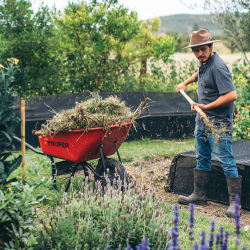How to Ensure That Carbon Credits Are Not Just Greenwashing
ORGANIC & REGENERATIVE ECO-CREDITS
@OrganicConsumer | | Read the Full Article
OCA’s organic farmer allies in Australia, the Organic and Regenerative Investment Coop have a new idea for how to channel money and resources into the hands of organic and regenerative farmers and ranchers. Organic and regenerative farmers, as we never tire of repeating, are the true stewards of the land and practitioners of animal husbandry. They are leading the organic movement to the next stage, Organic 3.0, regenerating soils and ecosystems; preserving and improving biodiversity; sequestering carbon above ground and below ground; producing healthy, nutrient-dense foods; expanding the market for organic and regenerative foods and products; and revitalizing rural communities and livelihoods.
According to ORIC:
“With recent questions over the legitimacy of the Australian carbon offset scheme, it’s never been more important that carbon emissions are offset with legitimate credits and are free of greenwashing.
Unfortunately, few offerings in the market consider the natural environmental variables faced by the landowners generating the credits, and have the data transparency and accuracy required to inspire confidence that the investment is actually achieving its drawdown goal.”
But the recently-released Eco-Credit by ORICoop is addressing many of these key issues in the current carbon offset market.
The farmer-owned credits are backed by extensive data collection and have been developed in accordance with the conditions, biodiversity and operations of each farm they’re provided by. Their transparency of data and the ability to directly purchase Eco-Credits from each farm means investors avoid the greenwashing associated with other carbon credit offerings.”
As ORICoop leader Carolyn Suggate explains:
“All farms are assessed as to their suitability for the program, based on their existing farming practices, the area of the farm and the intentions of future management.
We don’t want producers to be at risk from any carbon credit program, to overstate their carbon drawdown, or to be exposed by a natural disaster or severe weather event should the carbon levels in their soil or biodiversity decrease,” Suggate emphasized…
Read more: How To Ensure Your Carbon Credits Are Worth the Investment
For background on the need for Organic Eco-Credits, and strategic investments in the organic sector, see the interview with Ben Dobson of the Hudson Carbon Project and Ronnie Cummins of OCA at the 1 hour 17 minute segment of this North American panel on World Food Day.

